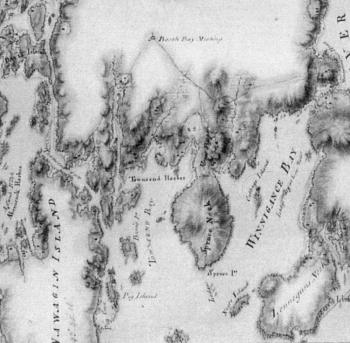The origin of the name Boothbay, part II
Last time I wrote about the historic names for our region: Winnegance, Townsend and Boothbay. I also covered some of the theories about the origin of the word Boothbay, including the harbor being said to be "snug as a booth" and the existence of similar names in Lincolnshire, England.
In the early 1990s I developed a possibly unprovable theory involving the Beaths, which Maine author-historian, Charles McLane, also arrived at independently a little later. The Beaths were prominent from the early decades of our 1730 settlement to the early 1900s. Family members in the 1700s owned much of the present lower business district of Boothbay Harbor, a large lot on the west side of Pisgah, and another sizable lot between Linekin Bay and Back Narrows.
Beath Bay?
The theory: perhaps our region of Townsend was renamed Beath Bay at incorporation on Nov. 3, 1764, and that the name was spelled Boothbay. John Beath, who lived through most of the 1700s, was instrumental in making it possible for the town to be incorporated by helping to organize the first church and to persuade the first minister to settle here.
Beath was one of the three first selectmen after incorporation and clerk of the town as well as the church at times. Under Massachusetts law, a town could not be established unless it had a place of worship and a minister, so a minister and meeting house were necessary to move forward. Beath would have been a very deserving candidate to have the town named after him. Perhaps he was the local representative who went to Boston to watch over the legislative process of incorporation. A case could be made for Boothbay being named for John Beath.
I wrote in 1995 that the main stumbling block to that theory was the lack of recorded mention by anybody (except me and Charles McLane) of that possibility. The Beath family preserved many historical scraps of information, some which have come down to the present and are at the historical society. Yet no mention of the town being named for them is among those papers. Also Beath has never appeared in a document as a spelling variant for the town. So that theory may be lacking.
Scotch-Irish settlers
I devoted quite a bit of space in my 2000 book, “Colonial Boothbay,” to the traits of the 1730 Scotch-Irish (current usage is Scots-Irish) settlers here. Their stubborn, proud and practical qualities made them fine pioneers as they spread across parts of eastern America in the early-to-mid 1700s.
As John Cameron Swayze used to say of Timex watches, those settlers could "take a licking and keep on ticking." Having been forcibly transported to Ireland from their native Scotland by the British, rejecting external authority was a way of life for them.
The English used them as frontier cannon fodder, so northern New England and the Appalachians had large Scots-Irish populations. I imagine they preferred the dangers of the frontier to living close to their English/Boston persecutors who called them, "the scum of the earth."
By 2009, lawyer and local historian Chip Griffin had also become fascinated by the Scots-Irish settlers of Boothbay and elsewhere. He was in contact with other researchers who were equally interested in that estimable group. In August 2010 Chip sent me his email conversation with Scots-Irish researchers John Mann and Jake Speers.
Booth-Beath
Jake wrote, "I am a County Antrim (Ireland) native, resident in New Jersey, currently doing some research on Londonderry, New Hampshire as a source of Ulster Scots or Scotch Irish if you like, to many places in the U.S. and Nova Scotia, and I need some details on who and when they came to places like Boothbay. I have a question. The name Booth in the language of the Ulstermen at home was frequently rendered (spelled) as "Beath." This was the case of the Booths (Beaths) in north county Antrim and still is the mode of pronunciation today. Could the name Boothbay be derived from that correlation or is is definitely from the English town of Boothby?"
Jake's point fits in well with my early 1990s theory. If Beath was and is pronounced Booth in parts of the world they came from almost 300 years ago, then it may just really be that Boothbay was named for Beath. If the name Beath Bay was suggested by a Scots-Irish man, the Boston clerk would have used his English brain to hear and spell Booth.
Naming
Our permanent settlers named things and places in a straightforward manner. Pre-existing Indian names based on characteristics were adopted, such as Ebenecook or places were named for people and characteristics: McFarlands Point (earlier Beaths Point), Linekin Bay, Green Island, Mark Island and Burnt Island. The settlers here had all they could do to keep themselves alive, and they did not reach for rhapsodic or whimsical names — simple and practical ruled.



























